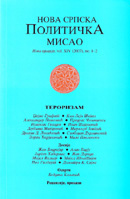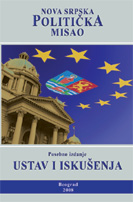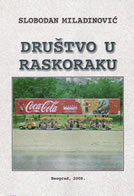| NSPM in English | |||
Moscow in the Middle |
 |
 |
 |
| nedelja, 01. novembar 2009. | |
|
(Time, Nov. 09, 2009)
Besides the U.S. and Iran, Russia seems to be the other major player on the nuclear issue. Whether or not Iran follows through on a draft deal to send much of its low-enriched uranium to Russia for further processing into fuel for a medical-research reactor, Moscow is in the middle. If the agreement works, it will boost Russia's international role, securing gratitude from the West without damaging Russia's ties to Tehran. If the accord falls through — or Iran agrees but does not comply — Moscow's support will be essential in imposing U.N. sanctions. China won't come along if Russia doesn't, and the Iranians know it. The Obama Administration argues that Russia and the U.S. have a common interest in stopping Tehran from building the Bomb. This is true, but only up to a point. Russia has a history of good relations with Iran. It has substantial trade interests there and appreciates Tehran's lack of support for radical Islamists in the North Caucasus. Moscow also fears that a pro-Western Iran would exclude Russian arms, technology and energy firms. Growing tension between President Dmitri Medvedev and Prime Minister Vladimir Putin complicates the picture. While Medvedev has been relatively forthcoming to the U.S. line on Iran, Putin (who is indirectly in charge of the state-controlled companies that trade there) has appeared skeptical. Putin said any decision on sanctions would be made not by Medvedev alone but by Russia's Security Council, which also includes himself, his Cabinet subordinates and parliamentary leaders loyal to the Prime Minister. Administration officials deny taking sides. Yet on the eve of his July summit in Moscow, Obama praised Medvedev and referred to Putin as having "one foot in the old ways of doing business." He later praised Putin too, but his Administration has done little to build bridges with the Prime Minister, who remains a crucial national decision maker. Secretary of State Hillary Clinton did not even see Putin when she was in Moscow recently, because the Administration did not coordinate the trip with his office; he was off signing an energy deal in China. The U.S. needs to start taking Russia seriously if it wants Moscow's help on Iran. The Administration insists that its "reset" of relations with Russia is a major priority. Unfortunately, as in many other policy areas, the President and his team try so hard to satisfy their critics that they appear unwilling to make critical choices, doing just enough to raise hopes but not enough to realize them. The Administration, for example, announced in mid-September that it was unilaterally dropping plans to base advanced missile-defense interceptors in Poland and the Czech Republic. Critics said Obama had given away the East European store to Russia in the vague hope of getting assistance on Iran. But a month later, literally on the same day that the U.S., Russia and others were negotiating with Iran in Vienna, Vice President Joe Biden was in Warsaw confirming plans to deploy Patriot ground-to-air missiles in Poland, and a U.S. official said in Tbilisi that "the process of Georgia's deeper integration into NATO is very important." No statement was likely to trouble Russia more. The following weekend, when Obama called Medvedev to look for support on Iran, he received a polite but noncommittal reply. After the call, Russia's top negotiator, Sergei Ryabkov, publicly urged "maximum patience" and "additional incentives" for Iran, neither of which is attractive to Washington. A senior official in Moscow told me that if the U.S. permanently stations Patriot batteries in Poland, Russia may proceed with deliveries — which had been suspended — of S-300 antiaircraft missiles to Iran. Such systems could significantly increase the cost of any air strikes. "Obama is beginning to repeat the Bush pattern," the official said, "where deeds do not match words." Working with Russia to block Iran's nuclear program will not be easy. Obama will have to do much better than he did when trying to win Russian support for Chicago's Olympic bid: he called Putin two days before the crucial vote, when Moscow was already committed to Rio, and offered nothing in return to the rather unsentimental Russian Prime Minister. Sadly, this too little, too late approach to Moscow on Iran's nuclear program may force the Administration to make precisely the decision it hopes to avoid: between a nuclear Iran and a new and dangerous war in a critical region. Simes is the president of the Nixon Center and publisher of the National Interest (http://www.time.com/time/magazine/article/0,9171,1933227,00.html) |
Ostali članci u rubrici
- Playing With Fire in Ukraine
- Kosovo as a res extra commercium and the alchemy of colonization
- The Balkans XX years after NATO aggression: the case of the Republic of Srpska – past, present and future
- Iz arhive - Remarks Before the Foreign Affairs Committee of the European Parliament
- Dysfunction in the Balkans - Can the Post-Yugoslav Settlement Survive?
- Serbia’s latest would-be savior is a modernizer, a strongman - or both
- Why the Ukraine Crisis Is the West’s Fault
- The Ghosts of World War I Circle over Ukraine
- Nato's action plan in Ukraine is right out of Dr Strangelove
- Why Yanukovych Said No to Europe

.jpg)








 Iran has thus far proved to be one of the most significant tests of President Barack Obama's national-security leadership. And the stakes are high: failure could mean an Iranian nuclear weapon and a Middle East arms race on the one hand, and military action by the U.S. or Israel that could inflame the region and create an Islamic backlash against the U.S. on the other. The key question is what price the President is willing to pay to avoid such outcomes.
Iran has thus far proved to be one of the most significant tests of President Barack Obama's national-security leadership. And the stakes are high: failure could mean an Iranian nuclear weapon and a Middle East arms race on the one hand, and military action by the U.S. or Israel that could inflame the region and create an Islamic backlash against the U.S. on the other. The key question is what price the President is willing to pay to avoid such outcomes.












